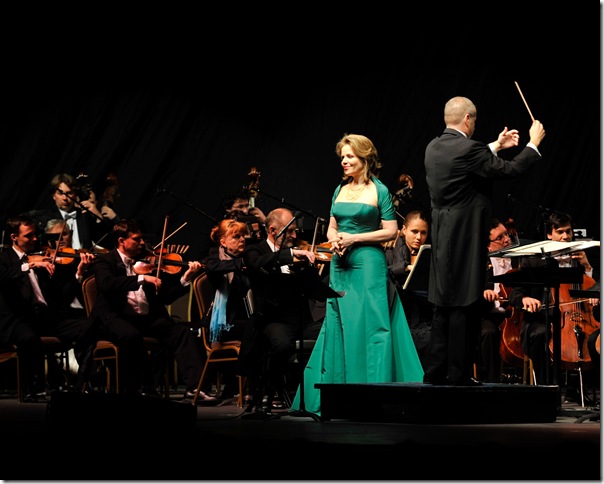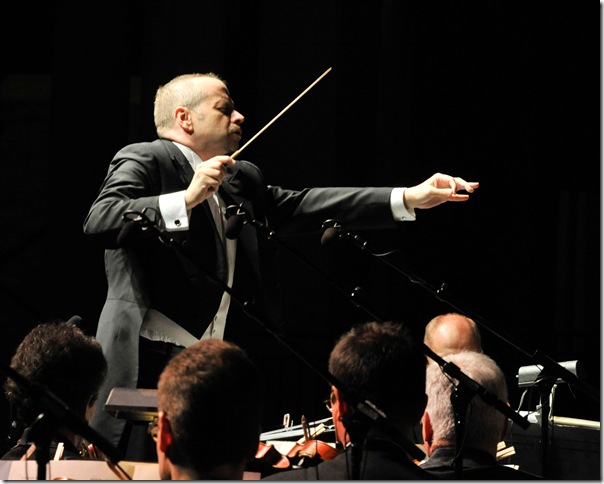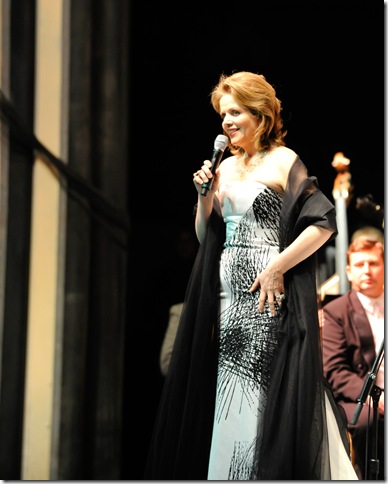She opened the New York Philharmonic’s current season with an infrequently heard song cycle by Olivier Messiaen, and her newest album is a collection of rarities from the verismo composers of the late 19th century.
One of the best things about Renée Fleming is her fondness for fresh, interesting repertoire, and the soprano offered ample evidence of this side of her art as she opened the Festival of the Arts Boca 2010 in Mizner Park on Saturday night.
A chatty, friendly presence on stage, dressed for the first half in green and the second in a grayish silver with a black wrap (“This is my summer dress,” she said to laughter from the large, slightly chilled crowd. “I’m so disappointed.”), Fleming joined conductor Patrick Summers and the Russian National Orchestra at the Count de Hoernle Amphitheater for an evening of arias and songs that ranged from bel canto to classic Broadway.
Fleming was in strong voice for most of the night, with the velvety lower range that has made her singing so distinctive in full flower, and her highest notes powerful without being shrill. In her very first aria, the coloratura showstopper D’amor al dolce impero, from Rossini’s 1817 opera Armida, all of Fleming’s beautifully rounded instrument could be heard, bottom to top, as she nimbly negotiated the busy embellishments of its repeats.
After an impressive Casta diva, the standout aria from Bellini’s Norma, Fleming moved to Tchaikovsky, presenting one of her signature pieces — the Letter Scene from Eugene Onegin — and something most unusual, an attractive aria (Pochudilis mne budto golosa) from The Oprichnik, an earlier (1871-4) Tchaikovsky opera.
The Onegin scene showed also that Fleming is a first-rate singing actress. She fully engages herself with the text, and in the climactic pages of this aria, with its famous descending-scale motif, Fleming sang with a straightforward purity that expertly mirrored Tatyana’s painful honesty in offering her heart and her life to a man who is about to reject her.
That first half of Fleming’s concert also featured the orchestra in the overture to Norma as well as the overture to Glinka’s Ruslan and Ludmila. Both were played with intensity and drive by this big band, though perhaps with less of the precision the group demonstrated last year under its chief conductor, Mikhail Pletnev.
Fleming opened the second half with a lovely quartet of songs by Richard Strauss — Ständchen, Freundliche Vision, Winterweihe and Zueignung — in which she could float her voice luxuriantly above the rich orchestration, and did so. She is a fine exponent of this repertoire, and in Winterweihe, her avowed favorite of the four, she brought an added layer of warmth and earnestness to its lullaby-like melody that dipped into the bottom of her range.
A verismo package of arias by Leoncavallo, Giordano and Mascagni that followed the Strauss (and the Intermezzo from Puccini’s Manon Lescaut) offered not just good singing, but revelation. Here is a body of overlooked music by Puccini’s contemporaries that deserves to be heard more often, and Saturday night’s audience gave them generous applause.
After beginning with a marvelously judged reading of the great farewell aria (Donde lieta usci al tuo grido) of Mimì from Act III of Puccini’s La Bohème, Fleming sang two arias from Leoncavallo’s treatment of the same story, which at the time was a source of bitter dispute between the two composers that destroyed their friendship. And the Leoncavallo version has much fine music, including Testa adorata, a wonderful aria for Marcello that was popular with an older generation of tenors.
Fleming sang two playful, witty arias of similar character, the better of which, Musette svaria sulla bocca viva, was a reminder in its melody and layout that Leoncavallo is also the composer of Mattinata (perhaps best-known in its pop-crooner version as You’re Breaking My Heart). In this and the second aria (Mimi Pinson, la biondinetta), Fleming sang with charm and sparkle.
Giordano’s death scene for Loris from Fedora (Troppo tardi! Tutto tramonta, tutto dilegua), which features a reminiscence of that opera’s hit tune, Amor ti vieta, was in Fleming’s hands moving and deeply affecting. Best of all was Un dì (ero piccina), from Iris, Mascagni’s Japanese-themed opera of 1898. A smartly paced aria based on swiftly moving back-and-forth minor chords and a catchy modal melody, this is a most effective theatrical piece even without the stage, and Fleming made a marvelous case for it.
A lush performance of the first Hungarian Dance (in G minor) of Brahms served as a nice crossover transition to Fleming’s final set, two songs by Richard Rodgers: Hello, Young Lovers, from The King and I, and You’ll Never Walk Alone, from Carousel. Fleming used a handheld microphone for these plush songs, perhaps because her voice had begun to tire, and also to help make herself heard above the elaborate arrangements here, which were replete with wind solos and numerous harmonic changes from the original.
The arrangement was misguidedly busy on Hello, Young Lovers, but quite effective on You’ll Never Walk Alone, with a strong trumpet motif that led the way in the middle to a massive brass statement. Fleming had plenty of stamina left for the higher reaches of You’ll Never Walk Alone, and after a standing, shouting demonstration from the audience (which in any case had handed her its collective heart during the Puccini), sang two encores: I Feel Pretty and Somewhere, from Bernstein’s West Side Story.
Although some of the topical rewrites of the I Feel Pretty lyrics, reflecting Fleming’s receipt of the keys of the city, weren’t really necessary, she sang both of these songs with the same sense of style, dedication and general excellence that distinguished this concert, and that continues to distinguish this artist’s inquisitive, intelligent career choices.
The Festival of the Arts Boca 2010 continues today with two literature events. Author Noël Riley Fitch will speak at 4 p.m. in the Cultural Arts Center on the second floor Plaza Real in Mizner Park; her lecture is titled Appetite for Life: Writing the Story of Julia Child. At 7 p.m. tonight at the Count de Hoernle Amphitheater, writer David Brooks of The New York Times gives a talk on the current political outlook. Tickets: $25-$50. For tickets, call 866-571-2787; for more information, call 561-368-8445 or visit www.festivaloftheartsboca.org.


